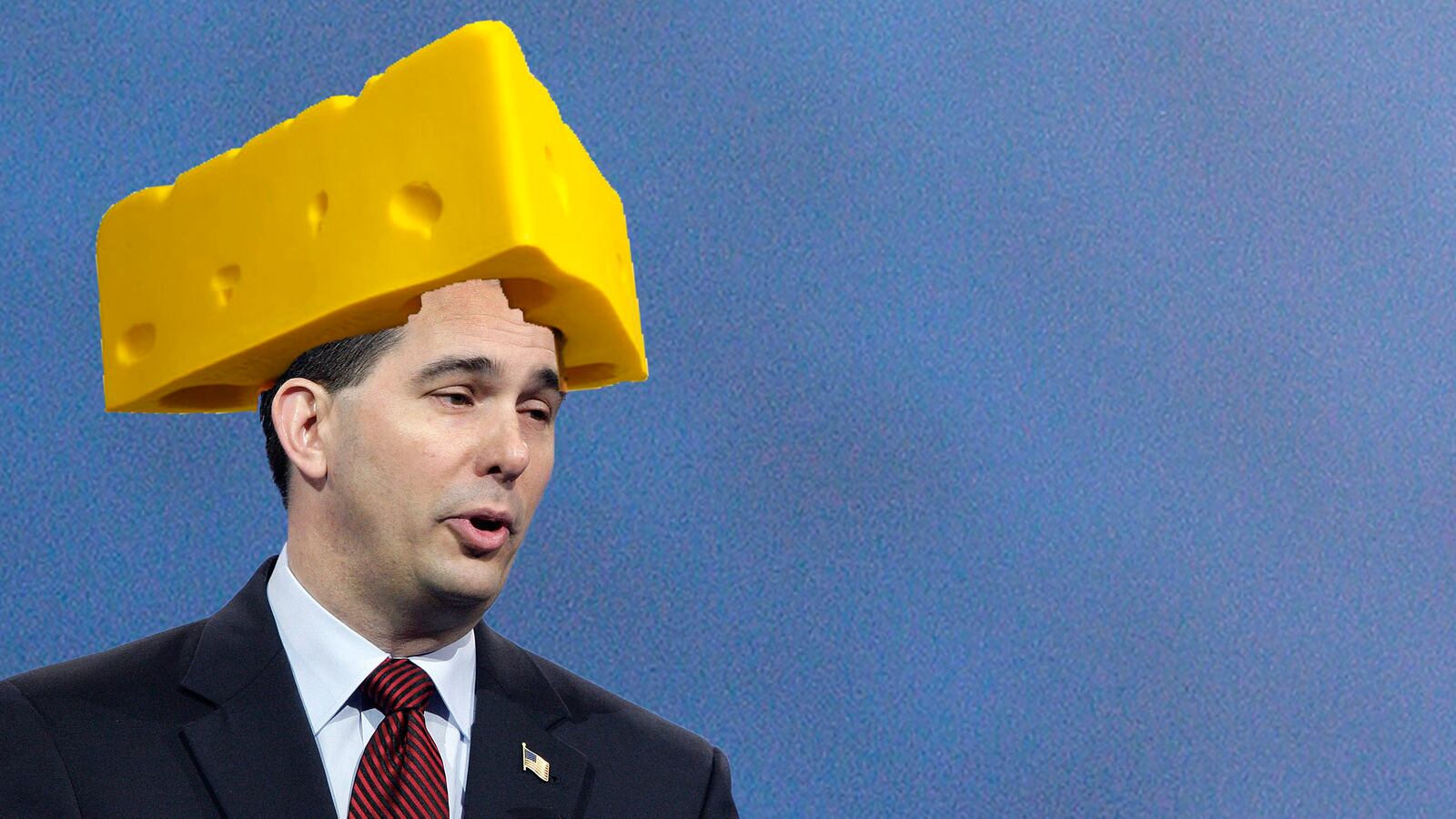Tens of thousands of protesters make for much better television than court documents, but that doesn’t mean we shouldn’t be paying attention to Scott Walker’s scandal-plagued re-election bid this year—even if it is unaccompanied by the hoopla of his 2012 recall election. In that year, Walker was able to best a weak Democratic candidate in an election where some voters backed him because of concerns about whether a recall was appropriate, and not because they supported his union-busting legislation.
This year, the most recent poll has Walker trailing the Democratic nominee, Mary Burke, by two percentage points among likely voters, and the embattled GOP incumbent has faced new allegations that he illegally coordinated outside spending during his recall election with groups like the Wisconsin Club for Growth. But while the 2012 recall excited liberals across the country (it seemed at times during that election that MSNBC’s Ed Schultz had moved to the Badger State), this year liberals can barely muster a shrug.
Part of this ennui, as Noam Scheiber at The New Republic points out, is that it’s not in anyone’s interest to make a big deal about Walker, despite the fact that he might be running for president in a couple years. After losing to him in 2012, liberals have a kind of political PTSD when it comes to Wisconsin, and are afraid of raising the stakes in the campaign.
Plus, Burke is a relatively moderate former business executive, which makes her a good candidate for a general election, but not exactly the best one to excite the progressive base. And without shots of hordes of protesters like the kind that swarmed the state capital in Madison two years ago, the campaign becomes far less compelling for television, and is thus unlikely receive much national coverage.
The outrage that Walker is provoking is of a less exciting variety this time around. In 2012, there were teachers and small-town government workers made furious by Walker’s efforts to quash collective bargaining rights for public employees. In 2014, however, there is far less uproar over Walker potentially violating campaign finance laws to encourage corporations to give unlimited donations to the Wisconsin Club for Growth—and only the Wisconsin Club for Growth. In an email to a consultant for that group who also served as an adviser to the governor in 2011, a Walker aide emphasized that the incumbent wanted “all the issue advocacy efforts run thru one group to ensure correct messaging.”
These efforts are further illustrated in an email that Kelly Rindfleisch, a former Walker aide, sent the governor before a fundraising trip in 2011, which told him to “stress that donations to [Wisconsin Club for Growth] are not disclosed and can accept corporate donations without limits.”
Rindfleisch, who has since been convicted of misconduct in office as a result of one of the many investigations surrounding Walker, added that the governor should stress to donors that he could accept corporate contributions that wouldn’t be reported.
A national Democratic consultant familiar with the race took pains to point out what a big prize Walker would be for the left. The Wisconsin governor “is very vulnerable, in a very dangerous spot for an incumbent and the fact that he hasn’t committed to serve out his next term means that what happens in Wisconsin is likely to have an effect on ’16.” But most importantly for Democrats, knocking off Walker would be a major consolation prize if they lose control of the Senate in 2014.
With prospects of holding on to a majority in the Senate uncertain, Walker offers a Democrats an enviable scalp to wave in November. After all, he has been one of the most divisive governors in the country, and serves in a key swing state. Plus, Walker evokes so much anger among parts of the Democratic base that would lessen the bite of potential losses in national races.
Although some national progressive groups are starting to focus on the race—Democracy for America announced Thursday that it was backing Burke to “put a stop to the flow of extreme right-wing legislation that has been poisoning” Wisconsin under Walker—the attention is still far less than in 2012, when outside Democratic groups flooded the Badger State with money. The result is that Walker still has a significant fundraising advantage heading into final two months of campaigning.
The question, though, is whether the incumbent can hold on and win in the swing state. Because while Walker may savor the absence of protesters demonstrating against him, his poll numbers are still worse than they were in 2012.





